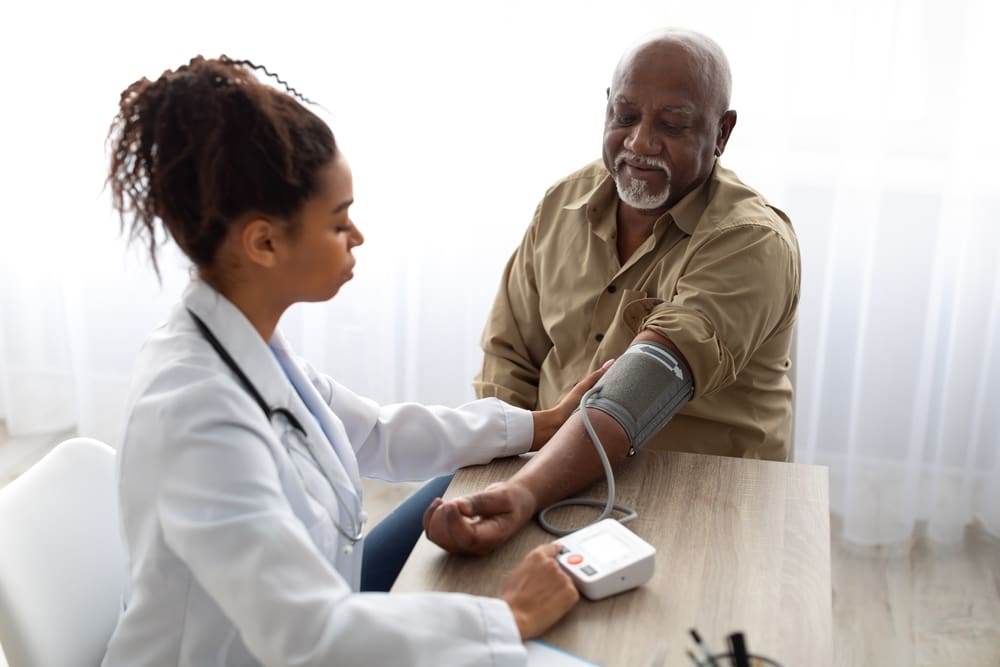High blood pressure, also known as hypertension, is a leading risk factor for stroke. It’s a silent threat, often showing no symptoms, but it can significantly impact your brain health. Fortunately, blood pressure medication plays a crucial role in preventing strokes and keeping your brain functioning optimally.
This article dives into the connection between blood pressure, stroke and how medication helps manage this risk. We’ll explore how these medications work, the different types available and the importance of adhering to your doctor’s prescribed regimen.
Understanding blood pressure and stroke risk
Blood pressure refers to the force exerted by blood against your artery walls as your heart pumps. It’s measured in two numbers: systolic pressure (the force when your heart beats) and diastolic pressure (the force between beats).
Healthy blood pressure typically falls below 120/80 mmHg. When blood pressure readings consistently exceed these levels, it’s considered high blood pressure. Chronically high blood pressure weakens and damages artery walls, making them more susceptible to:
- Narrowing: Plaque buildup (atherosclerosis) can narrow arteries, reducing blood flow to the brain.
- Aneurysms: Weakened areas in the arteries can bulge outward, forming an aneurysm. If it bursts, it can cause a hemorrhagic stroke.
- Blood clots: High blood pressure can damage the inner lining of arteries, increasing the risk of blood clot formation. A clot can travel to the brain and block blood flow, causing an ischemic stroke.
These complications significantly increase the risk of stroke. A stroke occurs when blood flow to part of the brain is interrupted, depriving brain cells of oxygen and nutrients. This can lead to brain damage, disability or even death.
How blood pressure medication works
Blood pressure medications work in various ways to lower blood pressure and reduce stroke risk. Here are some common types and their mechanisms:
- Diuretics: These medications help your kidneys remove excess fluid from your body, reducing blood volume and lowering blood pressure.
- Angiotensin-converting enzyme (ACE) inhibitors: ACE inhibitors prevent the production of a hormone that constricts blood vessels, allowing them to relax and blood pressure to decrease.
- Angiotensin II receptor blockers (ARBs): Similar to ACE inhibitors, ARBs block the action of the same hormone, promoting blood vessel relaxation and lowering blood pressure.
- Calcium channel blockers: These medications relax the muscles surrounding your arteries, allowing for easier blood flow and reduced pressure.
- Beta-blockers: Beta-blockers slow down your heart rate and reduce the force of your heart contractions, both of which contribute to lower blood pressure.
Your doctor will determine the most suitable medication based on your health factors, other health conditions you might have and potential side effects of specific medications.
The importance of medication adherence
Taking blood pressure medication as prescribed by your doctor is crucial for stroke prevention. Here’s why adherence is so important:
- Consistent blood pressure control: Medication needs time to take effect and maintain its blood pressure-lowering benefits. Skipping doses or stopping medication altogether can cause blood pressure to fluctuate and increase stroke risk.
- Long-term protection: Consistent medication use offers long-term protection against stroke and its devastating consequences.
- Reduced health care costs : By preventing strokes, medication adherence can help avoid expensive hospital stays and rehabilitation costs associated with stroke treatment.
If you experience side effects from your medication, don’t stop taking it without consulting your doctor. There are often alternative medications available, and adjusting the dosage might be an option. Open communication with your doctor is key to finding the right medication and managing your blood pressure effectively.
Living a heart-healthy lifestyle alongside medication
While blood pressure medication is a powerful tool, a healthy lifestyle is also essential for stroke prevention. Here are some additional steps you can take to keep your brain healthy:
- Maintain a healthy weight: Obesity is a significant risk factor for high blood pressure and stroke. Aim for a healthy weight through a balanced diet and regular exercise.
- Eat a heart-healthy Diet: Focus on a diet rich in fruits, vegetables and whole grains. Limit saturated and trans fats, sodium and added sugars.
- Engage in regular physical activity: Aim for at least 150 minutes of moderate-intensity exercise or 75 minutes of vigorous-intensity exercise per week. Regular physical activity helps manage weight, improve blood flow and lower blood pressure.
- Limit alcohol consumption: Excessive alcohol consumption can raise blood pressure. The American Heart Association recommends limiting alcohol intake to one drink per day for women and two drinks per day for men.
- Manage stress: Chronic stress can contribute to high blood pressure. Find healthy ways to manage stress, such as meditation, yoga or spending time in nature.
This story was created using AI technology.













